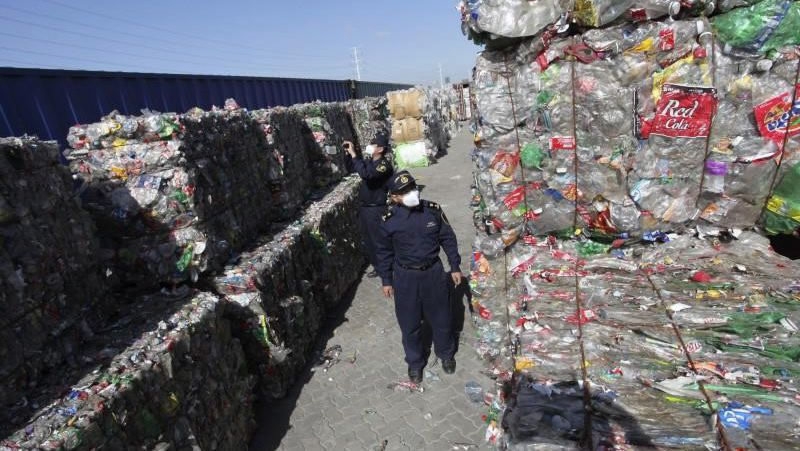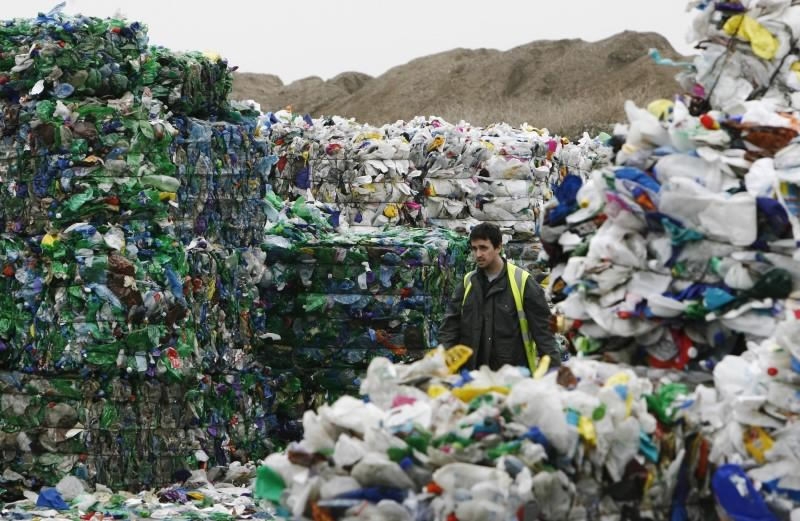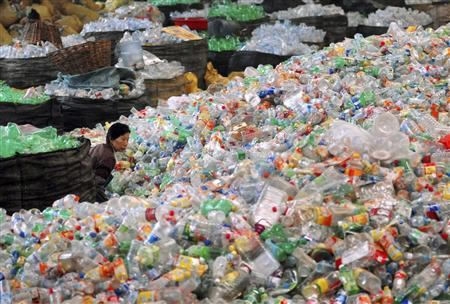
Tech & Sci
17:04, 08-Dec-2017
China's waste ban leads to pollution fear in developed nations
Alok Gupta

For nearly two decades, Chinese recyclers have been managing more than half of the world’s waste. Early next year, China will close its ports to shiploads of scraps.
The ban effective from January next year has left prominent exporters of plastic waste, the UK, EU and US, to re-think their waste treatment and recycling policies.
Last year, Chinese manufacturers imported a whopping 7.3 million metric tons worth 18 billion US dollars of waste metal, plastics and paper mostly from developed countries.
In the last five years, the UK has exported over 2.7 million tons of plastic waste to Chinese mainland and Hong Kong-based recyclers. And the US last year exported 1.42 million tons of plastics worth 495 million US dollars to China. The EU countries alone exported 87 percent of the recycled plastic to China.
China has notified the World Trade Organization (WTO) about staying 24 types of solid waste by the end of 2017.
In a noting, the Chinese government apprised the WTO, “that large amounts of dirty wastes or even hazardous wastes are mixed in the solid waste that can be used as raw materials. This polluted China's environment seriously."

A man walks through bundles of bottles waiting to be recycled at the Closed Loop recycling plant in Dagenham, east London on February 17, 2009. /Reuters
A man walks through bundles of bottles waiting to be recycled at the Closed Loop recycling plant in Dagenham, east London on February 17, 2009. /Reuters
“By the end of 2017, China will forbid the import of four classes, 24 kinds of solid wastes, including plastics waste from living sources, vanadium slag, unsorted waste paper and waste textile materials,” the note stated.
Business of waste and its consequences
In the last two decades, a boom in China's manufacturing sector led to massive exports all over the world. The EU, US and UK are significant consumers of Chinese products. The ships exporting various kinds of consumer goods to these countries often returned empty.
To make business sense, these countries started sending scraps in the return containers to China. The influx of scraps led to a boom in the country's recycling sector, but it also led to the import of banned wastes in China.
There have been instances when recyclers in Xinjiang imported radioactive materials from Kazakhstan, and hard-to-recycle products kept piling up in factories with a massive influx of electronic waste.
The import of banned products dangerously spiked water, soil and air pollution in the country.
China acts to control the waste menace
Chinese environmental and customs officials concerned over the massive dumping of the banned scraps initiated Operation Green Fence in 2013.
Inspectors checked containers to ensure prohibited scrap materials including non-recyclable plastic, metals and paper do not end up in recyclers’ yards in China.
During the month-long crackdown, 800,000 tons of scraps were returned to the US and import licenses of 247 companies were revoked.
Four years after the crackdown, another operation has been launched this year, “Border-gate Sword 2017," which is cracking down on the illegal trade of recyclable and waste materials with a focus on metals and plastics.
How will the UK, US and EU manage the waste?
A heavy reliance on China for recycling waste led to a limited number of recycling units in the developed countries. Environmentalists and industry leaders feel that much of the plastic waste may end up in fossil fuel-run incineration or pile up in landfills, triggering pollution.
The Environmental Services Association (ESA), a trade body for the UK’s waste and recycling industry, estimates that due to critical lack of infrastructure only 50 to 55 percent of waste in the country is treated.

A laborer sorts out plastic waste before it is processed at a recycling factory in Nanjing, east China's Jiangsu province, in this October 19, 2006 file photo. /Reuters/Leo Lang
A laborer sorts out plastic waste before it is processed at a recycling factory in Nanjing, east China's Jiangsu province, in this October 19, 2006 file photo. /Reuters/Leo Lang
If business continues as usual, then nearly six million tons of household trash will have no home by 2030.
The ESA claims that its members have invested around 6.74 billion US dollars (five billion pounds) in UK recycling and recovery facilities in the past five years.
“The government can drive recycling above the expected 50-55 percent range by spending 2.02 billion US dollars (1.5 billion pounds) and intervening to support recycling markets,” the ESA maintained.
Policymakers in the UK, busy in Brexit talks, appear unprepared to deal with the looming trash problem. Michael Gove, the environment secretary, told Guardian, “I don’t know what impact it will have. It is ... something to which – I will be completely honest – I have not given it sufficient thought.”
Unpreparedness is giving cold feet to the UK to the extent that in September, Ray Georgeson, chief executive of the Resource Association, an advocacy body in the UK, told a conference, “There is an urgent need for the government to get on the plane to Beijing to take a delegation to China and start negotiating.”
Similar uncertainty prevails in EU countries that recycle high-grade plastics and export low-grade consignments to China. Leaders are still struggling to figure out how to fill the recycle gap that will be created after China implements the ban next year.
The US is the only country in a position to quickly fill the gap, Jonas Oxgaard, an analyst at Sanford C. Bernstein & Co. told Bloomberg. The fracking boom that has boosted the supply of natural gas has made the US the cheapest place to manufacture and recycle plastic.
It may not be surprising to witness dumping of scrap materials in South East Asian countries, particularly the Philippines, Indonesia and Malaysia, which are likely to become easy targets of the Chinese ban on waste imports, the experts opined.
"China's move to ban waste will force developed nations to chalk out their own strategy to tackle waste. It may also boost new technology in the recycling sector and innovation in the packaging sector," said Nitin Dani, founder, and director of Shanghai-based non-profit Green Initiatives.

SITEMAP
Copyright © 2018 CGTN. Beijing ICP prepared NO.16065310-3
Copyright © 2018 CGTN. Beijing ICP prepared NO.16065310-3